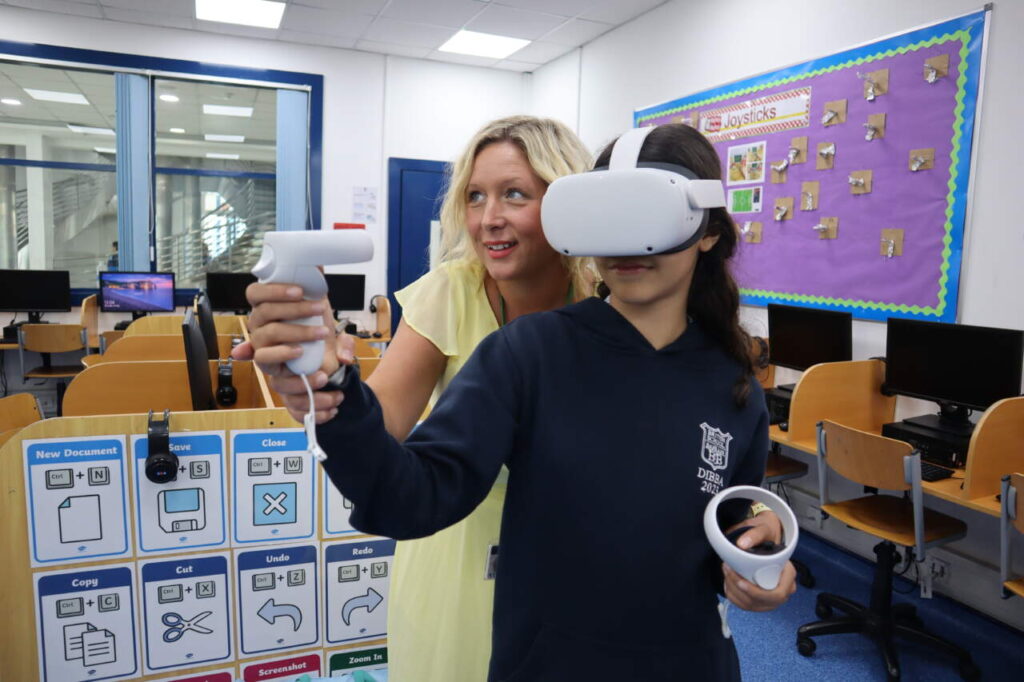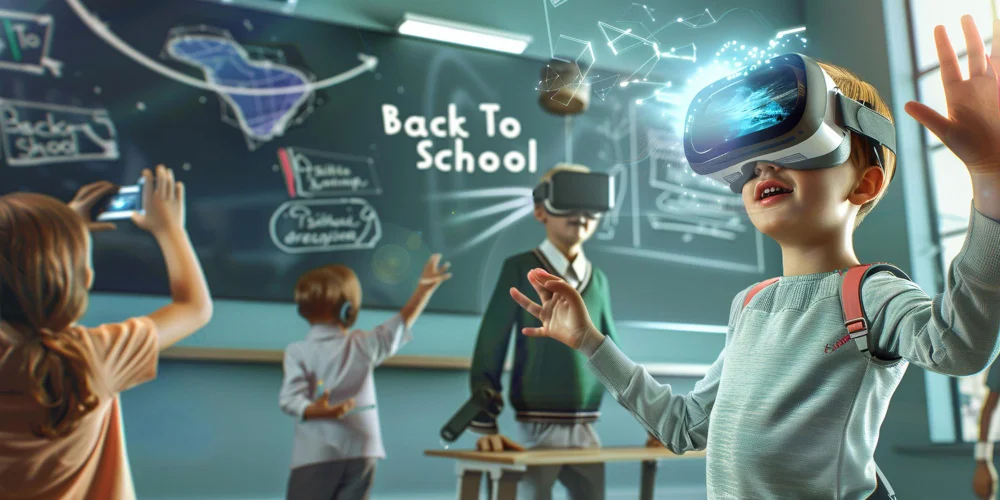Transforming Learning: The Power of Virtual Reality in Bahrain,Education is evolving at an unprecedented pace, and Bahrain is embracing this change with a strong focus on innovation. One of the most exciting advancements in recent years is the integration of Virtual Reality (VR) into the educational sector. This technology is not just a trend but a powerful tool that has the potential to redefine how students learn, teachers teach, and schools operate. By immersing students in interactive, three-dimensional environments, VR opens new doors for creativity, understanding, and engagement, making education more dynamic and effective than ever before.
Enhancing Student Engagement Through Immersive Experiences
One of the primary benefits of VR in Bahrain’s classrooms is the ability to engage students in ways traditional teaching methods cannot. VR allows students to step inside historical landmarks, explore the depths of the ocean, or even travel through the human body. These immersive experiences make learning memorable, turning abstract concepts into tangible realities. Students who may struggle with reading or traditional lectures can now experience education in a way that appeals to multiple senses, increasing their retention and understanding.
Teachers in Bahrain have noticed that VR not only sparks curiosity but also encourages active participation. Instead of passively listening to a lesson, students become explorers, problem solvers, and creators. This active learning approach builds critical thinking and improves motivation, ensuring that students are not just learning but also enjoying the process.
Personalized Learning for Every Student
Another powerful aspect of VR in education is its ability to cater to individual learning styles and needs. Every student learns differently, and traditional classrooms sometimes struggle to provide personalized attention. VR breaks down these barriers by offering adaptive learning environments that can be customized to suit each learner.
For example, a student who finds mathematics challenging can visualize complex equations in a 3D space, making abstract problems easier to comprehend. Similarly, language learners can immerse themselves in virtual environments where they interact with native speakers, enhancing their skills organically. This personalization ensures that students in Bahrain can achieve their full potential without being limited by conventional classroom constraints.

Bridging the Gap Between Theory and Practice
In many subjects, there is often a gap between theoretical knowledge and practical application. VR serves as a bridge, enabling students to apply what they learn in a safe and controlled environment. Science experiments, engineering simulations, and medical training can all be conducted virtually, reducing risk while still providing hands-on experience.
In Bahrain, schools and universities are beginning to adopt VR labs that allow students to experiment with concepts that would otherwise be difficult or dangerous to explore in real life. For instance, medical students can practice surgical procedures in a virtual operating room, gaining confidence and competence before performing on real patients. This integration of theory and practice ensures that students leave their education not only with knowledge but also with skills ready for real-world challenges.
Encouraging Collaboration and Teamwork
Virtual Reality is not just about solo learning; it also encourages collaboration and teamwork. In VR classrooms, students can work together on projects, solve problems collectively, and communicate in real time, regardless of physical location. This is especially valuable in Bahrain’s diverse educational landscape, where students come from different cultural and linguistic backgrounds.
Collaborative VR projects teach essential skills such as communication, leadership, and empathy. Students learn to listen to different perspectives, share responsibilities, and work toward common goals. These experiences prepare young learners for future workplaces where teamwork and cross-cultural understanding are increasingly important.
Expanding Access to Quality Education
One of the most transformative aspects of VR in Bahrain’s education sector is its potential to make high-quality education accessible to all. Remote and rural students can participate in virtual classrooms without needing to travel long distances. Special education students benefit from tailored virtual environments designed to support their specific learning requirements.
This democratization of education ensures that every student, regardless of location or ability, has the opportunity to experience world-class learning. By breaking down geographical and physical barriers, VR fosters inclusivity and equity, enabling Bahrain to nurture a generation of talented, well-prepared individuals.
Fostering Creativity and Innovation
VR in education is not only about consuming knowledge but also about creating it. Students can design virtual worlds, construct interactive models, and develop innovative solutions to real-world problems. This hands-on creativity encourages experimentation, risk-taking, and innovation qualities that are essential in the 21st-century knowledge economy.
Bahrain’s educational institutions are now beginning to introduce VR-based projects that encourage students to think outside the box. By combining technology with creativity, students develop a mindset that is curious, innovative, and solution-oriented. These experiences prepare them not just academically but also for entrepreneurial and professional success in the future.

Preparing Students for a Technological Future
As the world becomes increasingly digital, proficiency in technology is no longer optional. VR in education familiarizes students with cutting-edge tools, programming concepts, and virtual collaboration platforms. In Bahrain, incorporating VR into curricula ensures that students graduate not only with knowledge of core subjects but also with the technical skills necessary for a technology-driven world.
By using VR, students gain confidence in adapting to new digital tools, making them more competitive in global job markets. This forward-thinking approach aligns with Bahrain’s vision of building a knowledge-based economy where innovation, technology, and education work hand in hand.
Challenges and Considerations
While VR holds immense promise, integrating it into Bahrain’s education sector is not without challenges. The cost of hardware, the need for trained educators, and ensuring digital safety are key considerations. However, as technology becomes more affordable and accessible, these challenges are gradually being addressed. Schools are exploring partnerships with tech companies, government initiatives, and pilot programs to implement VR without compromising quality or equity.
It is also crucial to balance VR-based learning with traditional methods. While VR provides immersive experiences, critical thinking, interpersonal skills, and human interaction must continue to be nurtured through conventional teaching practices. A thoughtful combination of both approaches ensures that students receive a holistic education.
The Future of VR in Bahrain’s Education Sector
The potential of VR in Bahrain’s education system is vast and inspiring. From enhancing engagement to fostering creativity, promoting inclusivity, and preparing students for a digital future, VR is poised to become an integral part of learning. As more schools and universities adopt this technology, Bahrain is likely to see a transformation in the way education is delivered, making learning more exciting, effective, and impactful.
Virtual Reality is no longer a futuristic concept but a present-day reality that empowers students and educators alike. By embracing VR, Bahrain is not just adopting a new technology; it is creating a culture of innovation, curiosity, and excellence. The role of VR in the education sector is not only to teach but also to inspire, motivate, and equip students with the skills and confidence they need to thrive in a rapidly changing world.
Education in Bahrain is entering a new era, and Virtual Reality is leading the way. Students today are not only learning they are experiencing, exploring, and innovating. This immersive approach promises a brighter, smarter, and more capable generation ready to face the challenges of tomorrow with confidence and creativity.
Do follow Gulf Magazine on Instagram.
Also Read – Bahrain Empowers Youth for a Thriving Tech Innovation Future



